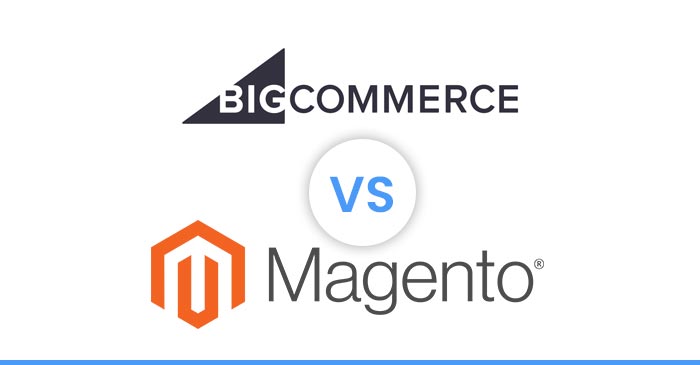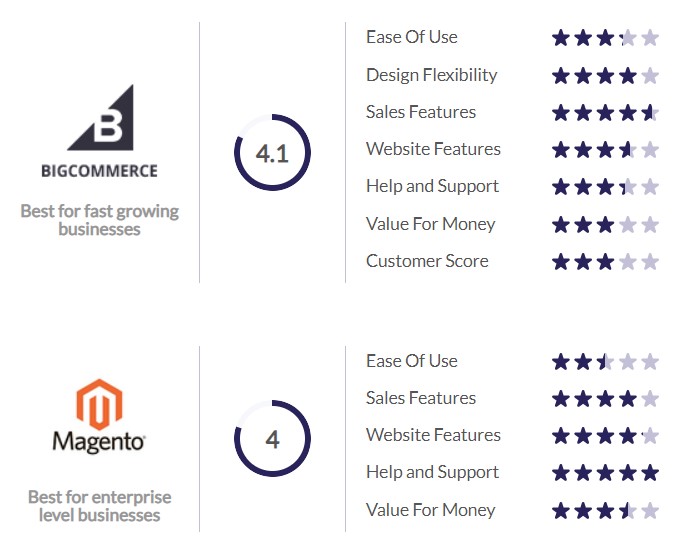
The debate on Magento vs. BigCommerce is here to stay. Business owners have never had an easy time selecting the best e-commerce platform, especially those new to online commerce. The decision between a hosted solution and an open-sourced one is still debatable. This article will thoroughly compare two well-known e-commerce platforms: BigCommerce vs. Magento.
BigCommerce and Magento have grown in popularity over the past few years. In this article, you will:
- View the comparison between BigCommerce with Magento (Magento 2 Open Source)
- Examine the main contrasts between BigCommerce and Magento.
- Determine which eCommerce solution is appropriate for your company.
- Find the finest tool for transferring data from BigCommerce to Magento or from Magento to BigCommerce.
Let’s end the BigCommerce vs. Magento debate once and for all.
Magento vs. BigCommerce
BigCommerce, which boasts the most built-in functionality of any e-commerce platform, has assisted nearly 100,000 customers in starting their online businesses. BigCommerce boasts several well-known brands on its customer list, including Toyota, Kodak, and Ben & Jerry’s. It also pretty much has everything you need to sell on social media. Additionally, a wide range of features are provided as standard, and scalable price options are available for online stores of various sizes and levels of expertise, making it perfect for companies wishing to expand quickly.
Magento presently manages over $100 billion in gross merchandise volume for 250,000 online businesses, proving its popularity. After its 2008 introduction, Magento was first purchased by eBay before being sold to Adobe, which is now its owner. Magento is an open-source e-commerce platform, which has advantages and disadvantages for users who aren’t as tech-savvy. Anyone may use Magento at no cost, which is a bonus. The warning? This isn’t for everyone because you must have extensive coding skills to benefit from it.
Magento vs. BigCommerce: Key Differences
BigCommerce is a Software-as-a-Service platform, so you won’t actually own the technology you’re utilizing; rather, you’ll only pay a monthly charge to ‘lease’ the system. You’ll begin by creating your website using a BigCommerce “theme,” a ready-made, tried-and-true template that is fully adaptable to your needs. The cost of BigCommerce is pretty high, and it is not the most affordable platform of its kind, but it is made to assist you in growing the scale of your brand and online presence.
On the other hand, Magento is an open-source e-commerce platform that even provides its open-source edition for free. However, when you choose a “hosted” e-commerce platform, you won’t have to pay for fees like hosting, security features, and SEO software, which you’ll need to organize individually. The drawback of using Magento to its full potential is that you must know how to code and customize your website beyond its theme. Magento is a strong platform that enables the highest level of creative freedom and flexibility.

1. Hosting
The most significant distinction between Magento vs. BigCommerce is hosting. Since Magento 2 is self-hosted, store owners must interact with outside merchants. In particular, BigCommerce’s platform is hosted, with hosting already included and no further fees. However, you are not permitted to liberation when selecting an appropriate hosting.
2. Pricing

The cost of BigCommerce varies as it has different subscription packages depending upon the usage and requirement. Whereas Magento’s community edition is free and the enterprise edition has customized pricing.
3. Design
Although Magento vs. BigCommerce e-commerce platforms offer free design templates, we can observe that their respective policies vary. Magento 2 comes with free themes through Magento Marketplace and more third-party websites in open source; however, BigCommerce only offers seven free themes, and others are charged from $145 to $235.
4. SEO
The establishment of client trust through SEO is crucial. SEO aims to optimize a website for high search engine rankings. Magento 2 is in the best position to improve the SEO ranking, per a ranking of the top e-commerce platforms. Using Magento 2 is a fantastic way to increase site traffic and visibility.
Why Are E-Businesses Switching Functional Platforms?
E-businesses are switching towards new technology to build, innovate and grow. The following factors contribute to this transition, and Magento vs. BigCommerce makes an immediate difference.
1. The flexibility of Future-Proof Business
The limits of what is feasible in e-commerce are being pushed by new technology, rising customer expectations, and heightened competition. Brands require adaptable technology that enables quick adaptation. BigCommerce’s platform-wide APIs let companies customize their websites and integrate them with third-party programs and services without modifying the source code.
2. Security to Count On

In e-commerce, security must always come first. With BigCommerce, you can, however, let someone else think of it first. BigCommerce automatically deploys all security patches for you, unlike Magento. And BigCommerce is PCI DSS 3.2, Level 1 & ISO/IEC 27001:2013 certified. Instead of worrying about security, spend your time creating your business.
3. Low Maintenance
Nobody likes making routine upgrades to maintain their website operational, including e-commerce business owners and their engineers. BigCommerce offers hassle-free, automatic updates and upgrades so you can concentrate on innovations that generate income while always having access to the newest features.
4. Scalable Growth
The vital difference between Magento vs. BigCommerce is the growth and development it provides to businesses. BigCommerce helps companies of all sizes and stages of development. BigCommerce provides the out-of-the-box functionality you require right away and the ability to effortlessly interface with a vast ecosystem of best-in-breed solutions to adapt as you develop, thanks to the speed, ease-of-use, high performance, and cheap cost of multi-tenant SaaS.
Pros and Cons of BigCommerce
Pros:
- Outstanding for multi-channel selling, especially on social media sites like Facebook, Instagram, and Pinterest.
- Excellent SEO tools to boost your company’s Google and Bing rankings.
- Most of the functionality you require is already built-in, making it more feature-rich than the competitors.
- 24-hour phone and live chat assistance.
- It has no transaction costs while accepting payments across all its programs.
- Top-tier e-commerce capabilities include the option to sell in many currencies and the capacity to provide shipping quotations in real-time.
Cons:
- It lacks a mobile app, making it challenging to manage your store while on the go.
- Finding some features in the editing interface can be challenging because it isn’t the most user-friendly.
- It’s inappropriate for folks with less technical proficiency because the builder occasionally uses difficult terms to discuss things.
Pros and Cons of Magento
Pros:
- A good knowledge base and FAQs provide self-service support for the more typical problems.
- Extremely expandable, with all the inventory control tools you need to keep your shop running as your catalog and sales expand!
- A free version is offered.
Cons:
- No round-the-clock assistance
- There are many expenses, especially when adding new add-on features and functionalities.
- Difficult to set up and operate.
Concluding Remarks
Consider functionality, price, design, and other factors when comparing potential e-commerce carts, such as Magento vs. BigCommerce. BigCommerce can be the ideal choice if you’re searching for a small to mid-sized solution. On the other hand, Magento is your best option if you’re searching for an enterprise solution or one with tremendous flexibility and the ability to adjust as the organization expands.
If you are looking for someone to develop your e-commerce website on Magento or BigCommerce, you can contact Arturo Digital. Our developers are competent and up-to-date with current trends and techniques. Don’t wait for the right time to establish your e-business, do it now.
Read more: Laravel vs. WordPress: Which Platform is Better for Business?